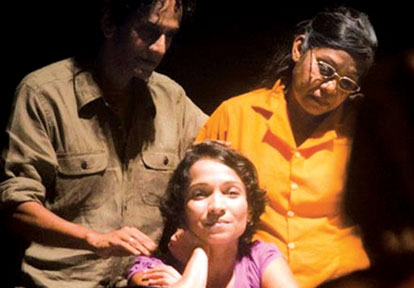Kalumali focuses on gender disparity
By Anuradha Kodagoda
What is the reason behind every fairytale princess living alone in a
tower and waiting for her prince charming? Why is it always a princess
or a woman who has to wait for her prince and for a man to rescue her?
Why doesn't she ever find a solution on her own for her salvation? Why
is it only women sing lullabies to babies? On the other hand, why is it
always that only men work hard and look after the family? These are
baffling questions.
 |
|
Ruwanthie de Chickera |
Gender ideology is so powerful that it can not be overlooked in a
developed or undeveloped society. However, theatre would be one of the
best media where sensitive topics of this nature could be addressed. The
recent drama Kalumali touched on the subject from a feminist viewpoint
and the play is about issues and the hassles the middle-class women go
through to keep themselves alive, without 'melting' down with the
responsibilities they face with motherhood.
Kalumali is the latest artistic creation of Ruwanthie De Chickera.
The drama is performed in Sinhala and English, thus giving the theatre
audiences a unique experience.
Excerpts of an interview with the director:
Question: What inspired you to produce Kalumali?
Answer: Kalumali is based on research I did with 13 women who
were engaged in English and Sinhala Theatre. I invited them to write
about motherhood in any art form that they like and present it. They
came up with real life experiences in the form of poems, short stories,
drama, discussions and letters. We worked together for almost one and a
half years and by that time all the artistes had contributed their best.
Research
Kalumali was one of the fairy tales which came up during the research
and I found that I could develop it further with Nadee Kammallaweera. We
used most of the experiences the other artistes contributed to develop
'Kalumali' as a complete play.
Q: Why did you want to do such research about motherhood?
A: It's not necessary to do research for everything. However,
I believe there are different formats for every art form. It must be
remembered that the facts that I reveal in Kalumali are not
scientifically proven. If you look at it from another angle it is not
research but real life experience and feelings that I gathered which I
felt were quite important for this type of drama.
Q: At the end of Kalumali you tried to convey some kind of a
'rolemodel' which you think every mother should be. Is it necessary to
convey messages to the audiences through any art form?
A: I admit it was a weak point in the script and conveying
messages is not my approach. It is possible that I may not have been
clever enough to overcome some of the obstacles which arose in the play.
However, the original lines which you felt were 'preachy' were supposed
to be played by Irangani Serasinghe. Who I think would have been the
ideal person for that character. I'm sure if she had acted as planned,
nobody would have felt any difference because she in my estimation,
perfectly fits the character of 'Achchi'.
 |
|
A scene from Kalumali |
Throughout the rehearsal process I invited a few people to watch the
play. It was nearly impossible for them to agree with the character of
'Dil', which most of them thought was quite selfish. Because her husband
in the play Kalana is not an alcoholic nor had he ill-treated her,
nobody saw a reason for Dil's dissatisfaction with life.
Learning process
The process that I had to go through with Kalumali was a learning
process for me, as well to realise how complicated motherhood is. To
keep the audience with the characters in the play, I had to explain more
than I used to. Though I wanted the play to be challenging the audience
did not allow me to do so. Therefore, I did some compromises willingly
and consciously to keep the majority of the audience with the play.
Q: What is your impression about the Sri Lankan theatre-goers?
A: I think they are fantastic, quite intelligent and a
challenging fact for the well-being of Sri Lankan theatre. Actually, it
is they who keep the Sri Lankan theatre alive. Otherwise in Sri Lanka
there's no sponsorship from the State and it's difficult to get
sponsorships for the theatre. Therefore, I must say that only the
artistes and theatre-goers are the ones who keep the Sri Lankan theatre
alive.
Q: By restricting Kalumali within a middle-class family, don't
you think you've marginalised your audience?
A: If the boundaries and the limitations are clear to me and
to the audience, I think it is quite all right to go on with them. I
never think that I could cover the entire issues of motherhood by
Kalumali which I'll never even try. Rather in Kalumali I have touched
upon the issues that confront a middle-class woman due to motherhood. I
believe there are millions who suffer from the same issues. Even though
the situation is quite normal I think I could carry a strong idea about
the struggle or the pain that middle-class women may go through in their
lives by being left out of their dreams and desires due to motherhood
only because of gender disparities. In another aspect even the class
factor is quite illogical when it comes to gender. Because being in a
Buddhist society it is a well-known fact that the gender is important to
reach the utmost spiritual enlightenment 'Nirvana'.
|



